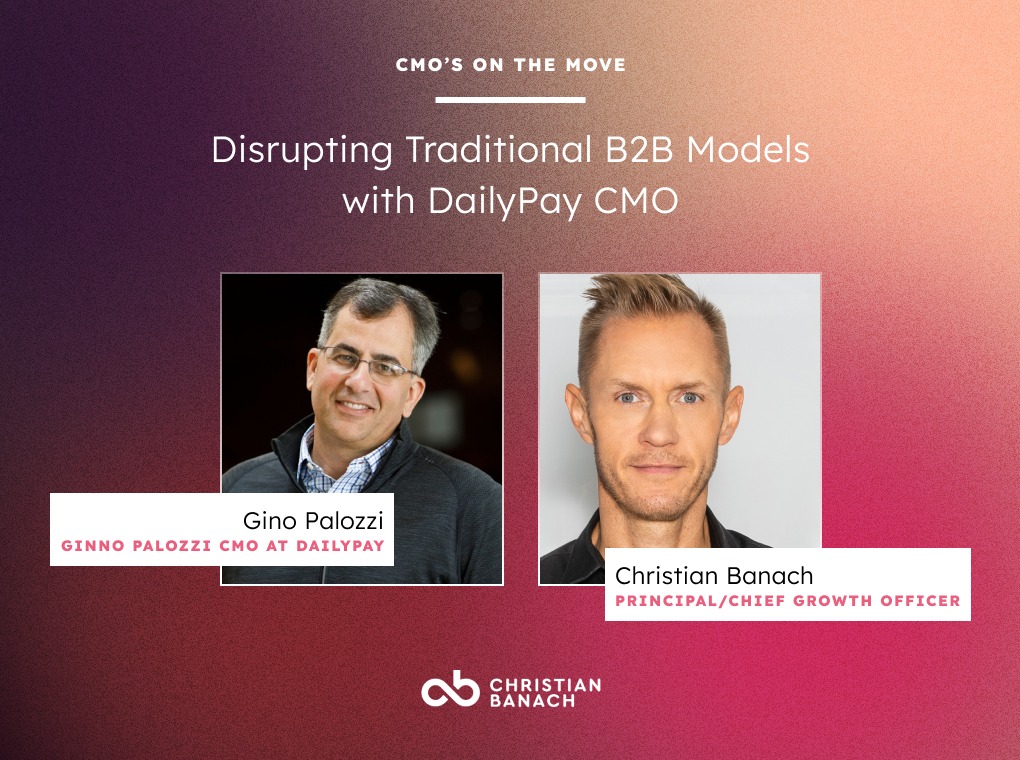/ Executive Interviews
Disrupting Traditional B2B Models with DailyPay CMO Gino Palozzi
By: Christian Banach



DailyPay’s recently appointed CMO Gino Palozzi is a disruptor. He worked in management consulting for years, helping companies rethink the structure of their organizations, and now he’s helping DailyPay revolutionize the way people think about the on-demand pay industry.
Palozzi shared his thoughts with Christian Banach on how these kinds of disruptions are happening in FinTech, his personal journey to the CMO chair, and what agencies who want to work with companies like DailyPay should be on the lookout for.
Where to find Gino Palozzi: LinkedIn
Where to find Christian Banach: LinkedIn
Banach:
Tell me more about your background.
Palozzi:
I grew up in upstate New York. I was the son of a barber who ran his own business for 64 years and I learned a lot of hard work and discipline from that experience. I went to Boston for graduate school, where I met my wife, and for the last 20 years I’ve lived in Columbus, OH with her and my two kids.
Banach:
Early in your career, you were a management consultant with IBM. How has that experience shaped how you look at marketing?
Palozzi:

Management consulting is a discipline that’s about helping solve problems for companies. Understanding how to help companies “get there,” is a strong skillset to have. You can really apply it to any discipline, including marketing.
I appreciate people with similar backgrounds who are looking to move into marketing because they have that intuition. Marketing is more data-driven than it has been before, and knowing your stuff can help you communicate marketing needs with leadership.
Banach:
You’ve primarily been in the B2B space. How has it evolved in the last few years?
Palozzi:
B2B is becoming more like B2C. You don’t sell to organizations or companies; you sell to individuals within those companies. I like to refer to this concept of “B2B” sometimes as “B2P,” or business-to-person. You have a buying group of individuals who have different needs who you are looking to resonate with and understand.
Banach:
I love that concept of B2P. What ways are you seeing businesses do that effectively? What does effective personalization look like?
Palozzi:
There are obvious, more traditional ways, like looking at intent data or trying to understand the characteristics of certain personas. However, the best way to understand the needs of your customers is to talk to them. Have different conduits to get that feedback from them.
For me that means using a combination of quantitative and qualitative audience metrics. Bigger companies use tools like AI too, but nothing beats something as simple as listening to the sales calls that your team is having to understand that “last mile.”
That idea is central to personalization, but customer needs are very much a “timebound” thing. You must be agile in understanding what they want. Some things that marketing leaders care about are evergreen, but spikes in things like intent can detect how their needs might be changing.
To be authentic in reaching out, you still must consider that you’re talking to a real person. I encourage marketers to be authentic and envision who they are reaching as they are writing messaging, even if they are creating content to scale.
Banach:
We’ve done similar work when doing outbound prospecting campaigns for our clients—encouraging our people to look at the LinkedIn pages of people we’re trying to reach and understand them on that human level.
Palozzi:
I encourage people to look at the communications they are writing and consider if they would really write that way to reach a real person. Be authentic, be simple, and be human as opposed to moving into “buzzword bingo” that marketing can sometimes fall into.
Banach:
Tell us more about DailyPay and your role there.
Palozzi:
DailyPay is a financial wellness benefit. We offer employers the ability to give their employees access to their pay as they earn it. It gives people more financial stability and control over what they’ve earned. We believe in employee-centric companies, and we think what is in the best interest of the employees will be in the best interest of employers looking to attract and retain talent.
We’d like to see earned wage access or on-demand pay everywhere, so as CMO I’ve been trying to bring that vision to life.
Banach:
I remember reading a book about where the weekly or biweekly paycheck came from–it asked “who set that standard and why are we even still following it?” Dislodging that culturally-ingrained idea is interesting.
Palozzi:

One of the challenges is overcoming the muscle memory of making the two-week paycheck the standard. We’re helping payroll teams see the benefits of it and think about what could really be best for employees. As a marketer, we can tell people what the benefits are, but my job is a lot easier when our clients can tell people what those benefits are. .
Banach:
Breaking through the status quo is an obvious challenge you’re facing, alongside others: regulatory, compliance, newly emerging competition–what do you see as the biggest challenges for this role?
Palozzi:
We see the regulatory side as less of a challenge and more as part of our responsibility to be part of the conversation.
Where I see the biggest challenge is the perception of on-demand pay. It isn’t a payday loan—we are paying employees’ earned wages on behalf of their employer. The challenge is effectively communicating that to the employees themselves. Awareness and education are really the biggest hurdles we are facing—showing people that this is really a benefit.
Banach:
You’re marketing to get new companies onboard, but once you get those new companies, there is probably a marketing initiative that needs to happen for employees apart of the organization to educate them–is that fair to say?
Definitely, that means we have to go through a double funnel of marketing to employers and then demonstrating to employees that it is a valuable benefit they should consider. Interestingly, one of the benefits that our users often cite is the visibility into their pay and how much money they are making throughout the week.
It isn’t always about spending the money you have, it is also about having that sense of security and the tools to plan your finances.
Banach:
Are you working with any outside agency partners?
Palozzi:
Someone who is willing to take the time to understand the outcomes we’re trying to drive and what we’re trying to achieve. It’s easy to say what the “best practices” are, but effective partners also know enough to articulate where we are and what our immediate needs may be.
A partner who takes the time to listen, understands our goals, and also understands our realities is what I expect most. A sense of urgency and accountability are also key to collaborating in a realistic and agile way.
Banach:
What are you looking for in an agency partner?
Palozzi:
Someone who is willing to take the time to understand the outcomes we’re trying to drive and what we’re trying to achieve. It’s easy to say what the “best practices” are, but effective partners also know enough to articulate where we are and what our immediate needs may be.
A partner who takes the time to listen, understands our goals, and also understands our realities is what I expect most. A sense of urgency and accountability are also key to collaborating in a realistic and agile way.
Banach:
Anything else you’d like to share?
Palozzi:
One thing I feel like I’m not asked enough about is how earned wage access plays a role in a company’s DE&I strategy. We see that conversation more nowadays, but understanding the merits of providing financial stability and equality is increasingly important in today’s world. It’s a challenging topic, but one we’re embracing and talking to people more about.
Banach and Palozzi discussed more about DailyPay’s mission, structure, and the way sales and marketing work together.
Edited for brevity.
Sign up now! Every Monday, get breaking news of recent CMO appointments, motivation to start your week positively, and innovative business development insights.